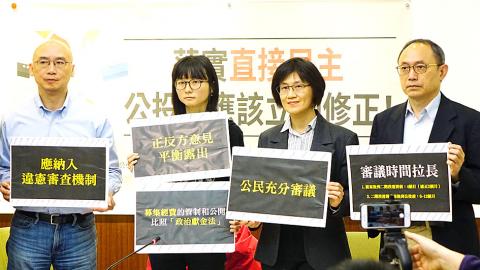A coalition of civic groups yesterday urged the Legislative Yuan to prolong referendum proposals’ review periods and introduce more measures to ensure the quality of proposals.
“Referendums should facilitate public discussion on important issues, and ensure human rights and social justice, but last year’s referendums failed in both regards,” Covenants Watch convener Huang Song-lih (黃嵩立) told a news conference in Taipei.
On Nov. 24 last year, three referendums that limited LGBT rights were passed — including one intended to push for a same-sex partnership law over an amendment to the definition of marriage in the Civil Code.

Photo: George Tsorng, Taipei Times
The results sparked heated debate over whether there should be an additional law banning human rights issues being put to referendums and whether such referendums are constitutional.
To improve the quality of referendums, the Central Election Commission’s review period of each referendum proposal should be prolonged from 30 to 60 days to four to six months, he said.
To allow more public discussion and prevent misinformation, there should be a waiting period of six to 12 months for every referendum before its scheduled voting date, he said.
Currently, referendums can be held as soon as 28 days after they pass the commission’s final review, during which period the commission is required to host at least five debates on the referendum, he said.
“Twenty-eight days are definitely not enough. That is only enough time to spread rumors, not enough to ensure public discussion of important issues,” he added.
Requiring each referendum proposal to go through a combined 18-month period before the public can vote on it might sound like a long time, but it is relatively short compared with the time required in other nations, National Chengchi University law professor Lin Chia-ho (林佳和) said, adding that in Switzerland the process typically takes more than 40 months.
“Referendum results have the same effect as a law, but while legislators must go through a complex process to pass a law, passing a referendum is very easy,” Lin said.
To help the public make informed decisions about referendums, the government, especially the Legislative Yuan and Executive Yuan, should clearly explain each referendum’s effect and state their opinions in advance, he said.
Meanwhile, to prevent unconstitutional referendums from being held, the commission should have the option of asking the Council of Grand Justices to review referendum proposals that could be unconstitutional, he said.
Members of the public should also have the right to ask for a constitutional review by the council if they are concerned about whether a proposal is unconstitutional, he added.
Election rules on the limits and transparency of political donations should apply to donations for referendum proposals to ensure fairness, Taiwan Association for Human Rights secretary-general Chiu Ee-ling (邱伊翎) said.
An unequal distribution of resources turned last year’s referendums into “tools for manipulation by rich political parties and corporations,” she said, adding that the results reflected “democratic backsliding.”
With more referendums expected to be held next year, the Legislative Yuan should make the necessary amendments to the Referendum Act (公民投票法) by the end of this legislative session to prevent the same problems from reoccurring, she said.

ANOTHER EMERGES: The CWA yesterday said this year’s fourth storm of the typhoon season had formed in the South China Sea, but was not expected to affect Taiwan Tropical Storm Gaemi has intensified slightly as it heads toward Taiwan, where it is expected to affect the country in the coming days, the Central Weather Administration (CWA) said yesterday. As of 8am yesterday, the 120km-radius storm was 800km southeast of Oluanpi (鵝鑾鼻), Taiwan’s southernmost tip, moving at 9kph northwest, the agency said. A sea warning for Gaemi could be issued tonight at the earliest, it said, adding that the storm is projected to be closest to Taiwan on Wednesday or Thursday. Gaemi’s potential effect on Taiwan remains unclear, as that would depend on its direction, radius and intensity, forecasters said. Former Weather Forecast

As COVID-19 cases in Japan have been increasing for 10 consecutive weeks, people should get vaccinated before visiting the nation, the Centers for Disease Control (CDC) said. The centers reported 773 hospitalizations and 124 deaths related to COVID-19 in Taiwan last week. CDC Epidemic Intelligence Center Director Guo Hung-wei (郭宏偉) on Tuesday said the number of weekly COVID-19 cases reported in Japan has been increasing since mid-May and surpassed 55,000 cases from July 8 to July 14. The average number of COVID-19 patients at Japan’s healthcare facilities that week was also 1.39 times that of the week before and KP.3 is the dominant

The Chinese Communist Party’s (CCP) working group for Taiwan-related policies is likely to be upgraded to a committee-level body, a report commissioned by the Mainland Affairs Council (MAC) said. As Chinese President Xi Jinping (習近平) is increasingly likely to upgrade the CCP’s Central Leading Group for Taiwan Affairs, Taiwanese authorities should prepare by researching Xi and the CCP, the report said. At the third plenary session of the 20th Central Committee of the CCP, which ended on Thursday last week, the party set a target of 2029 for the completion of some tasks, meaning that Xi is likely preparing to

US-CHINA TRADE DISPUTE: Despite Beijing’s offer of preferential treatment, the lure of China has dimmed as Taiwanese and international investors move out Japan and the US have become the favored destinations for Taiwanese graduates as China’s attraction has waned over the years, the Ministry of Labor said. According to the ministry’s latest income and employment advisory published this month, 3,215 Taiwanese university graduates from the class of 2020 went to Japan, surpassing for the first time the 2,881 graduates who went to China. A total of 2,300 graduates from the class of 2021 went to the US, compared with the 2,262 who went to China, the document showed. The trend continued for the class of 2023, of whom 1,460 went to Japan, 1,334 went to